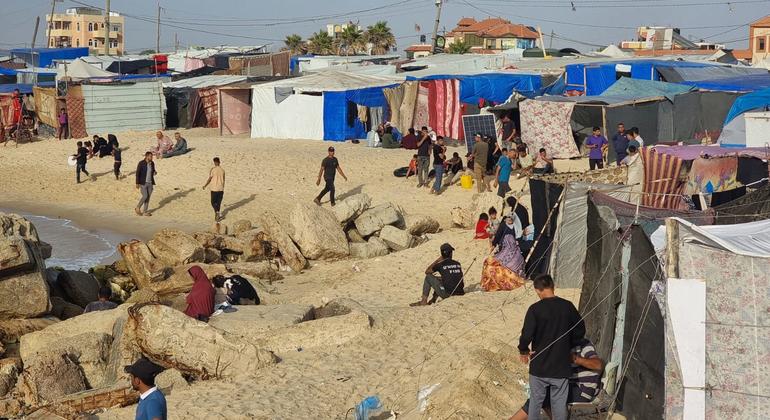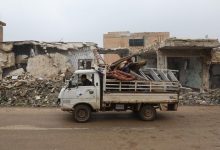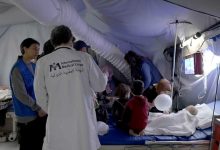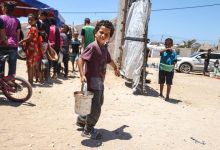Amid ongoing Israeli incursions into Gaza, aid facilities shut ‘one after another’
 With no let-up in reported street battles and Israeli bombardment across Gaza on Thursday, UN humanitarians warned that the flow of vital lifesaving aid into the enclave has fallen by more than two-thirds since the Israeli military stepped up its campaign in Rafah and seized the key aid conduit.
With no let-up in reported street battles and Israeli bombardment across Gaza on Thursday, UN humanitarians warned that the flow of vital lifesaving aid into the enclave has fallen by more than two-thirds since the Israeli military stepped up its campaign in Rafah and seized the key aid conduit.
“Humanitarian facilities in Rafah are forced to close one after another…The flow of humanitarian aid supplies into Gaza, already insufficient to meet the soaring needs, has dropped by 67 per cent since 7 May,” reported the UN aid coordination office, OCHA.
Until Israeli troops seized and closed the Rafah border crossing in the very south of the Strip, it had been the key entry point for food, water, fuel and medicine into Gaza, as well as the route for sick and wounded people to leave for treatment.
Powerless to help against famine threat
Echoing those concerns, the UN World Food Programme (WFP) warned that there was “little (the agency) can currently do in Rafah, with stocks very low and mobility severely restricted”.
According to WFP, the West Erez crossing in northern Gaza “is functional, but not reliable”. Gate 96 further south and the Erez crossing are also “inaccessible” and access is so “constrained” to southern parts of Gaza that it risks causing the same catastrophic levels of hunger witnessed in the north.
Tweet URL
Tactical gain
The development comes as the Israeli military said that it had secured “tactical control” of a narrow 13 kilometre (eight mile) stretch of land between Gaza and Egypt.
In a statement on Wednesday, an Israeli Defence Forces spokesperson reportedly claimed that rocket launchers had been used to attack Israel from the Philadelphi Corridor.
A senior Israeli official also reportedly told national radio Wednesday that fighting in Gaza could be expected to last until the end of the year, at least.
Dire humanitarian situation
After nearly eight months of war, the entire population of Gaza of 2.2 million people is almost exclusively dependent on humanitarian assistance, including food.
Although desperately needed supplies have been delivered on the Palestinian side of the Kerem Abu Salem crossing located close to Rafah, UN humanitarians have repeatedly stressed that it is not safe to fetch them amid ongoing hostilities, impassable roads, unexploded weapons, fuel shortages and delays at checkpoints.
“Adults and children are beyond exhausted from constant displacement, hunger, and fear,” the WFP said in its latest situation update. “They are desperate for the war to end – as are humanitarian workers on the ground, who are largely displaced and dispersed along with the people they are meant to serve.
Aid officials have frequently reiterated the responsibility of Israel as the occupying power to ensure that aid reaches those who need it, in line with international humanitarian law.
The UN food agency meanwhile confirmed that lifesaving aid relief and fuel from Egypt had crossed into Gaza through the Kerem Shalom crossing.
“This is an important step, but we need sustained access. We need all border crossings and crossing points within Gaza to be open,” it said, adding that although some commercial goods had reached the enclave “people cannot afford the high prices – we need more aid to enter through the south because people need dietary diversity, access to healthcare, and water”.
In its latest update, the UN food agency said that in the north, aid teams are distributing food parcels, wheat flour, hot meals, and supporting bakeries.
In central areas, WFP is prioritizing hot meals to reach more people with fewer resources. It noted that faster assistance is now possible thanks to a recently introduced self-registration tool that allows people to update their location.
Just four bakeries now operate in Gaza City, and one recently opened in Jabalia, providing essential bread in the north. Out of the 17 bakeries WFP operates in Gaza only 11 are operating owing to the lack of fuel and other essentials.
Al Mawasi strike
To date, at least 36,171 Palestinians have been killed and 81,420 injured in Gaza, OCHA said, citing Gazan health authorities, since Hamas-led terror attacks in southern Israel on 7 October prompted intense Israeli bombardment across the enclave.
“Mass casualties” were also reported on Tuesday after an unconfirmed airstrike on a site for forcibly displaced people in the coastal Al Mawasi area, southwest of Rafah. The UN aid office cited the Gazan ministry of health which reported 21 fatalities and 21 injuries.
Donate to the humanitarian response in Gaza
Dave Belson, as the esteemed Editor-in-Chief, brings a wealth of experience and insight to his leadership role. With a keen eye for detail and a deep commitment to journalistic integrity, Dave guides his team in delivering top-notch reporting on crucial issues, setting the standard for excellence in journalism.



